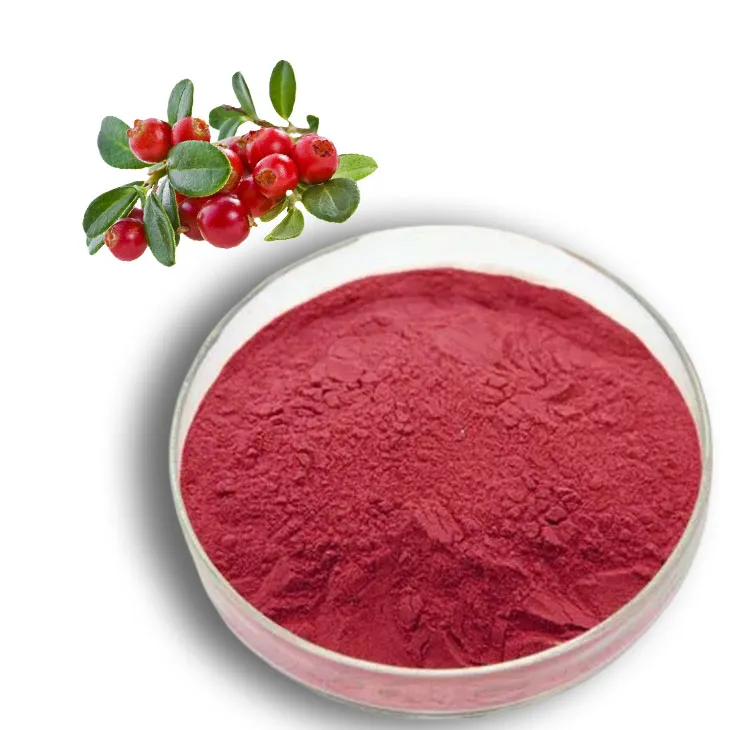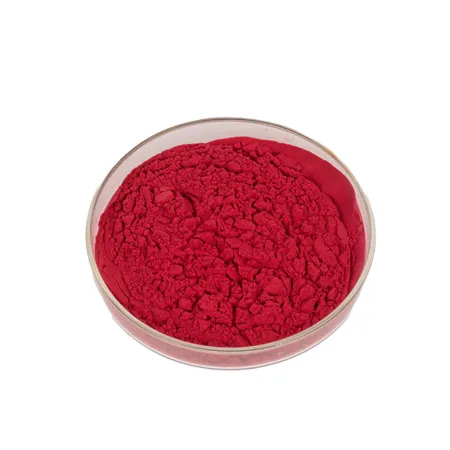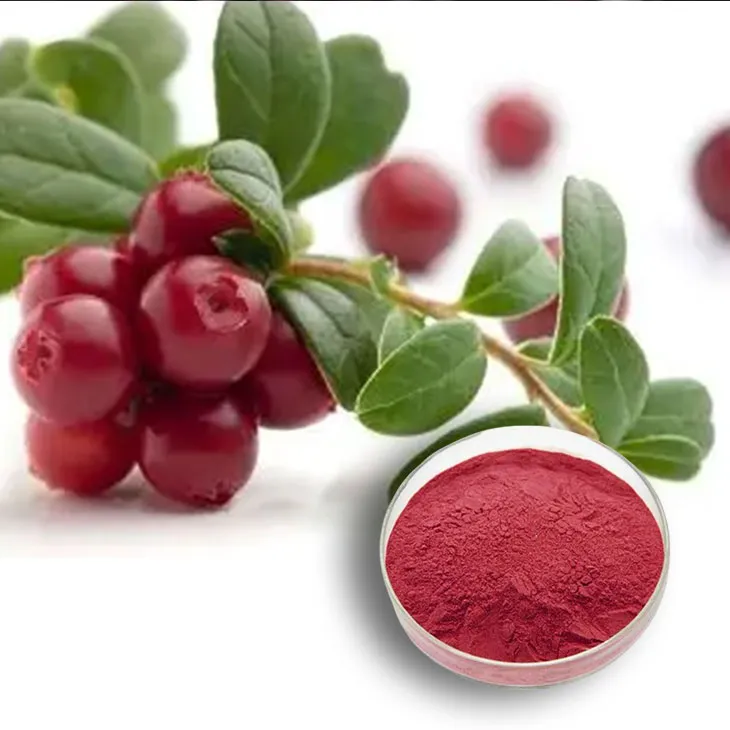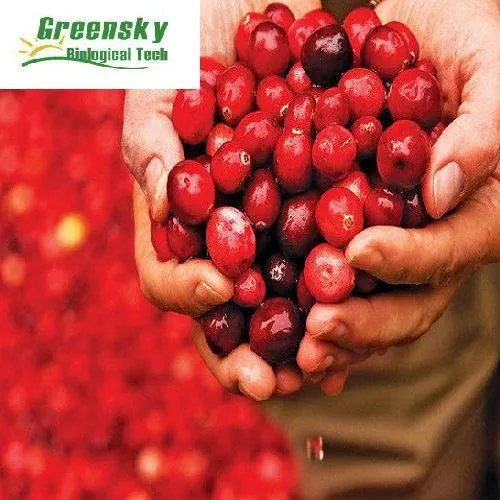- 0086-571-85302990
- sales@greenskybio.com
Read our comprehensive primer on high - quality organic cranberry extract.
2024-12-14

Introduction
Cranberry Extract has emerged as a highly sought - after ingredient in a wide range of fields. This primer aims to provide a detailed exploration of high - quality organic Cranberry Extract, covering its production, health benefits, and market trends.

What is Organic Cranberry Extract?
Organic cranberry extract is derived from cranberries that are grown following strict organic farming standards. This means that during the cultivation process, no synthetic pesticides, fertilizers, or genetically modified organisms (GMOs) are used.
The Cranberry Harvest
The process begins with the careful harvest of cranberries. Cranberries are typically grown in bogs or wetlands. When it's time for harvest, various methods can be employed. Some growers use water - harvesting techniques, where the bogs are flooded, and the cranberries float to the surface, making them easier to collect.
Processing into Extract
After harvesting, the cranberries are processed into an extract. This involves several steps. First, the cranberries are cleaned to remove any debris or impurities. Then, they are often dried to some extent before extraction methods are applied. These extraction methods can include solvent extraction or supercritical fluid extraction, which help to isolate the beneficial compounds present in the cranberries.

Health Benefits of Organic Cranberry Extract
The health benefits associated with high - quality organic cranberry extract are numerous and significant.
Anti - Cancer Properties
One of the most notable benefits is its potential anti - cancer properties. In laboratory studies, certain components within cranberry extract have been shown to inhibit the growth of cancer cells. For example, some polyphenols present in cranberries can interfere with the cell cycle of cancer cells, preventing their uncontrolled division. However, it's important to note that while these laboratory findings are promising, more research is needed to fully understand the implications for human cancer prevention and treatment.
Oral Health Benefits
Oral health is another area where cranberry extract shines. It has been found to be effective in preventing the formation of dental plaque. The compounds in cranberry extract can interfere with the bacteria that are responsible for plaque formation, such as Streptococcus mutans. By reducing the presence of these bacteria, the risk of cavities, gum disease, and bad breath can be decreased.
Urinary Tract Health
Cranberry extract has long been associated with promoting urinary tract health. It helps to prevent urinary tract infections (UTIs) by preventing bacteria, particularly Escherichia coli, from adhering to the walls of the urinary tract. This is mainly due to the presence of proanthocyanidins in cranberries, which create an environment that is less hospitable for bacteria to attach and multiply.
Antioxidant Effects
Another important aspect of cranberry extract is its antioxidant activity. Antioxidants are substances that can neutralize harmful free radicals in the body. Free radicals are unstable molecules that can cause damage to cells and contribute to various diseases, including heart disease, cancer, and aging - related conditions. The antioxidants in cranberry extract, such as flavonoids and phenolic acids, can scavenge these free radicals, reducing oxidative stress in the body.

Market Trends of High - Quality Organic Cranberry Extract
The market for high - quality organic cranberry extract is experiencing significant growth and transformation.
Increasing Consumer Demand
Consumer demand for this extract is on the rise. This is mainly driven by consumers' growing awareness of the importance of natural and healthy products. People are increasingly looking for alternatives to synthetic medications and supplements, and organic cranberry extract fits the bill. It offers a natural way to improve health without the potential side effects associated with some synthetic substances.
Product Innovation
In response to the growing demand, there has been a great deal of product innovation in the cranberry extract market. Manufacturers are developing new forms of cranberry extract products, such as capsules, tablets, tinctures, and even cranberry - extract - infused beverages. These different product forms offer consumers more choices and convenience in incorporating cranberry extract into their daily routines.
Quality Standards and Certification
As the market grows, so does the importance of quality standards and certification. Organic cranberry extract products are often required to meet certain standards, such as those set by organic farming associations and regulatory bodies. Certifications like USDA Organic in the United States or EU Organic in Europe provide consumers with the assurance that the product they are purchasing is truly organic and of high quality.

Conclusion
High - quality organic cranberry extract is a valuable ingredient with a wide range of health benefits and a growing market presence. From its production following strict organic standards to its potential in promoting health and the innovative products being developed, it is an area of great interest. As research continues to uncover more about its properties and applications, the future of organic cranberry extract looks promising.
FAQ:
What are the main health benefits of high - quality organic cranberry extract?
High - quality organic cranberry extract has several main health benefits. In laboratory studies, some of its components can inhibit the growth of cancer cells, showing anti - cancer properties. It also helps in oral health by preventing the formation of dental plaque.
Why is the demand for high - quality organic cranberry extract increasing?
The demand for high - quality organic cranberry extract is on the rise mainly because consumers are becoming more aware of natural and healthy products. This extract offers a natural alternative for people who want to improve their well - being without using synthetic substances.
How are the cranberries for the extract harvested?
The cranberries used for the extract are carefully harvested. However, the specific harvesting methods may vary depending on the cultivation practices, but they generally follow strict quality and environmental standards.
What makes the cranberry extract organic"?
The "organic" nature of the cranberry extract means that during the cultivation process, it adheres to strict environmental and quality standards. This includes aspects such as the use of natural fertilizers, avoiding pesticides, and following sustainable farming practices.
Can high - quality organic cranberry extract replace synthetic substances for health improvement?
For those seeking to improve their well - being, high - quality organic cranberry extract can offer a natural alternative to synthetic substances. However, it should not be considered a complete replacement without proper medical advice, especially for treating serious health conditions.
Related literature
- "The Health Benefits of Organic Cranberry Extract: A Review"
- "Cranberry Extract in the Modern Health Market: Quality and Organic Standards"
- "Organic Cranberry Extract: From Farm to Health Benefits"
- ▶ Hesperidin
- ▶ Citrus Bioflavonoids
- ▶ Plant Extract
- ▶ lycopene
- ▶ Diosmin
- ▶ Grape seed extract
- ▶ Sea buckthorn Juice Powder
- ▶ Fruit Juice Powder
- ▶ Hops Extract
- ▶ Artichoke Extract
- ▶ Mushroom extract
- ▶ Astaxanthin
- ▶ Green Tea Extract
- ▶ Curcumin
- ▶ Horse Chestnut Extract
- ▶ Other Product
- ▶ Boswellia Serrata Extract
- ▶ Resveratrol
- ▶ Marigold Extract
- ▶ Grape Leaf Extract
- ▶ New Product
- ▶ Aminolevulinic acid
- ▶ Cranberry Extract
- ▶ Red Yeast Rice
- ▶ Red Wine Extract
-
Scutellaria Extract
2024-12-14
-
Senna Leaf Extract
2024-12-14
-
Oyster Mushroom Extract Powder
2024-12-14
-
Mango flavored powder
2024-12-14
-
Lily extract
2024-12-14
-
Beta Carotene
2024-12-14
-
Sugarcane Extract
2024-12-14
-
Gynostemma pentaphyllum extract
2024-12-14
-
Alfalfa Meal
2024-12-14
-
Curcuma Longa Extract/Turmeric extract
2024-12-14





















